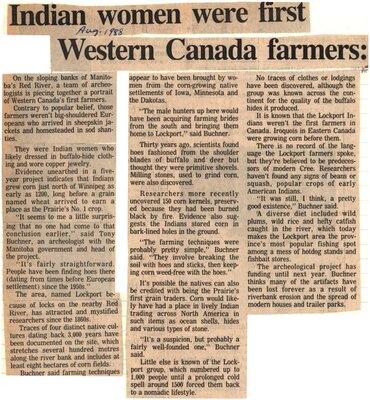"Indian Women Were First Western Canada Farmers"
- Full Text
- Indian women were first Western Canada farmers:
On the sloping banks of Manitoba's Red River, a team of archeologists is piecing together a portrait of Western Canada's first farmers.
Contrary to popular belief, those farmers weren't big-shouldered Europeans who arrived in sheepskin jackets and homesteaded in sod shanties.
They were Indian women who likely dressed in buffalo-hide clothing and wore copper jewelry.
Evidence unearthed in a five-year project indicates that Indians grew corn just north of Winnipeg as early of 1200, long before a grain named wheat arrived to earn a place as the Prairie's No. 1 crop.
"It seems to me a little surprising that no one had come to that conclusion earlier," said Tony Buchner, an archeologist with the Manitoba government and head of the project.
"It's fairly straightforward. People have been finding hoes there (dating from times before European settlement) since the 1950s."
The area, named Lockport because of locks on nearby Red River, has attracted and mystified researchers since the 1860s.
Traces of four distinct native cultures dating back 3,000 years have been documented on the site, which stretches several hundred metres along the river bank and includes at least eight hectares of corn fields.
Buchner said farming techniques appear to have been brought by women from the corn-growing native settlements of Iowa, Minnesota and the Dakotas.
"The male hunters up here would have been acquiring farming brides from the south and bringing them home to Lockport," said Buchner.
Thirty years ago, scientists found hoes fashioned from the shoulder blades of buffalo and deer but thought they were primitive shovels. Milling stones, used to grind corn, were also discovered.
Researchers more recently uncovered 150 corn kernels, preserved because they had been burned black by fire. Evidence also suggests the Indians stored corn in bark-lined holes in the ground.
"The farming techniques were probably pretty simple," Buchner said. "They involve breaking the soil with hoes and sticks, then keeping corn weed-free with the hoes."
It's possible the natives can also be credited with being the Prairie's first grain traders. Corn would likely have had a place in lively Indian trading across North America in such items as ocean shells, hides and various types of stone.
"It's a suspicion, but probably a fairly well-founded one," Buchner said.
Little else is known of the Lockport group, which numbered up to 1,000 people until a prolonged cold spell around 1500 forced them back to a nomadic lifestyle.
No traces of clothes or lodgings have been discovered, although the group was known across the continent for the quality of the buffalo hides it produced.
It is known that the Lockport Indians weren't the first farmers in Canada. Iroquois in Eastern Canada were growing corn before them.
There is no record of the language the Lockport farmers spoke, but they're believed to be predecessors of modern Cree. Researchers haven't found any signs of beans or squash, popular crops of early American Indians.
"It was still, I think, a pretty good existence," Buchner said.
A diverse diet included wild plums, wild rice and hefty catfish caught in the river, which today makes the Lockport area the province's most popular fishing spot among a mess of hotdog stands and fishbait stores.
The archeological project has funding until next year. Buchner thinks many of the artifacts have been lost forever as a result of riverbank erosion and the spread of modern houses and trailer parks.
- Mystery Question
- Who is the author of this article? What publication was this article printed in?[Please answer by clicking on the Comments tab]
- Media Type
- Newspaper
- Item Types
- Articles
- Clippings
- Description
- "on the sloping banks of Manitoba's Red River, a team of archeologists is piecing together a portrait of Western Canada's first farmers."
- Date of Original
- Summer 1988
- Subject(s)
- Personal Name(s)
- Buchner, Tony
- Local identifier
- SNPL002594v00d
- Collection
- Scrapbook #1 by Janet Heaslip
- Language of Item
- English
- Creative Commons licence
 [more details]
[more details]- Copyright Statement
- Public domain: Copyright has expired according to Canadian law. No restrictions on use.
- Copyright Date
- 1988
- Contact
- Six Nations Public LibraryEmail:info@snpl.ca
Website:
Agency street/mail address:1679 Chiefswood Rd
PO Box 149
Ohsweken, ON N0A 1M0
519-445-2954



